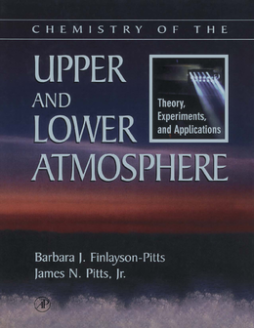
BOOK
Chemistry of the Upper and Lower Atmosphere
Barbara J. Finlayson-Pitts | James N. Pitts, Jr.
(1999)
Additional Information
Book Details
Abstract
Here is the most comprehensive and up-to-date treatment of one of the hottest areas of chemical research. The treatment of fundamental kinetics and photochemistry will be highly useful to chemistry students and their instructors at the graduate level, as well as postdoctoral fellows entering this new, exciting, and well-funded field with a Ph.D. in a related discipline (e.g., analytical, organic, or physical chemistry, chemical physics, etc.). Chemistry of the Upper and Lower Atmosphere provides postgraduate researchers and teachers with a uniquely detailed, comprehensive, and authoritative resource. The text bridges the "gap" between the fundamental chemistry of the earth's atmosphere and "real world" examples of its application to the development of sound scientific risk assessments and associated risk management control strategies for both tropospheric and stratospheric pollutants.
- Serves as a graduate textbook and "must have" reference for all atmospheric scientists
- Provides more than 5000 references to the literature through the end of 1998
- Presents tables of new actinic flux data for the troposphere and stratospher (0-40km)
- Summarizes kinetic and photochemical date for the troposphere and stratosphere
- Features problems at the end of most chapters to enhance the book's use in teaching
- Includes applications of the OZIPR box model with comprehensive chemistry for student use
"The authors have put together an up-to-date large-format volume covering all aspects of atmospheric chemistry. The book includes some 5000 references as well as problems (and answers) for students. The book can serve as a text for atmospheric chemistry courses or as a reference for scientists and engineers.":--BULLETIN OF THE AMERICAN METEOROLOGICAL SOCIETY, May 2000
"Atmospheric chemistry is an exciting, relatively new field" states the initial sentence of this very impressive, nearly encyclopedic overview of the field's fundamental science, pressing issues, and major policy concerns. Both of the book's authors have played important roles in the field's development. ...In nearly a thousand (8.5 X 11") full size pages they have assembled an extremely thorough and up-to-date (with references through mid-1999) overview of the field. ...This book should be required reading for anyone who is seriously interested in atmospheric chemical processes and/or their policy implications. My colleagues and I think so highly of its utility as an atmospheric chemistry handbook that we subsidize its purchase by collaborating graduate and postdoctoral students who spend time in our laboratory working on atmospheric chemistry projects."--Bulletin of the American Meteorological Society, November 2000
"Finlayson-Pitts and Pitts (both, Univ. of California at Irvine) offer a comprehensive, excellent review of the current stage of knowledge in and applications of atmospheric chemistry. It is clearly and concisely written and extremely well organized, facilitating its use as both a teaching text and reference resource. The book not only documents the physical and chemical processes that determine atmospheric composition but also provides a concise review of measurement methods and a wealth of data regarding observed concentrations of many key atmospheric compounds. The book also discusses chemical aspects of current environmental change issues and, in the final chapter, provides and interesting overview of risk assessment as applied to tropospheric air quality. All the diagrams are in black-and-white but are of high quality and clarity. Other features that add significantly to the overall quality of the book are the thorough and well-documented reference sections at the end of each chapter, the comprehensive index, and the problem sections that span a range of difficulty levels. Not surprisingly, this excellent book is authored by two scientists who have significantly contributed to the discipline of atmospheric chemistry over the last 40 years. Upper-division undergraduates and up." --S. C. Pryor, Indiana University, CHOICE, June 2000.
